-
Posts
1801 -
Joined
-
Last visited
Content Type
Forums
Store
Crowdfunding
Applications
Events
Raffles
Community Map
Posts posted by guidol
-
-
Yes the WTL-40110175 3.8v 10.000mAh battery has
3x red (PB+) and
3x black (PB- GND)
and
1x yellow (Overvoltage?) or Temperature)
Here in Turkey I do only find a 3.7v 10.000mAh Cell, but without the yellow cable (only red and black):
https://www.n11.com/urun/1260110-37v-10000mah-li-polymer-pil-devreli15a-87767963
The battery PDF gives me very less clues

-
Yesterday I did start to install armbian trixie iot on my Pinebook.
Second part in debian - after the u-boot) starts, but then the Pinebook shuts off, because of a low battery(?)I did charge the whole day and powered off in the evening.
Today the Pinebook stand on my table with a swollen battery. I removed it and happily it doesnt crash anything else than the battery holder.
But now it doenst boot up complete like with a low battery.
After the u-boot debian trixie does boot , but at the middle of the messages it does shutdown

Can it run completly without battery? I have normally a 5V/2Ah power-supply connected and that did work the last years.Now I can only try to use a 5V/60W quick-charge Power-Supply.
Anyone has experiences with that?
Thanks for info in advance...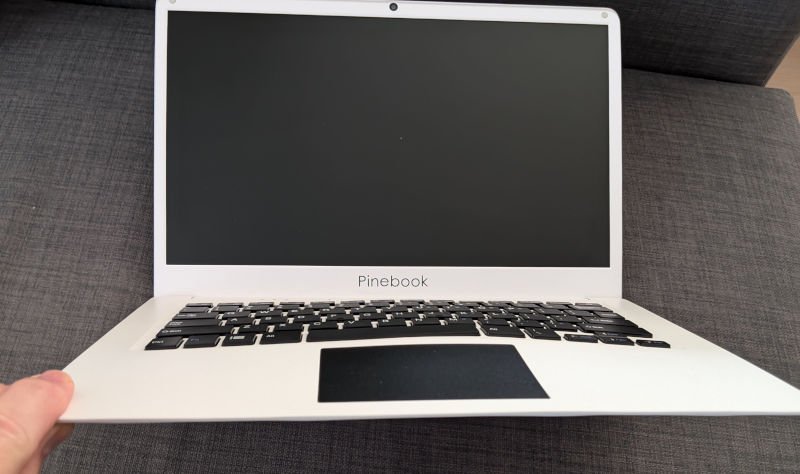
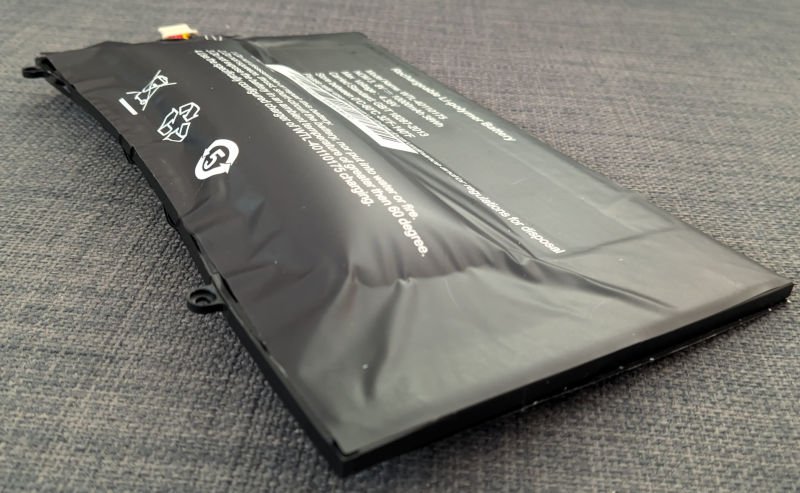
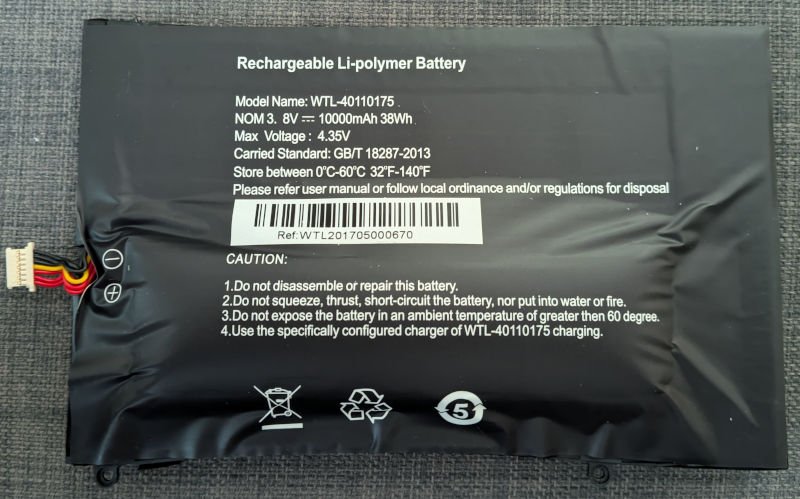
-
Case with Hat:
Hat only:
does work with every armbian I had used out-of-the-box.
I use them (2) as Samba-Server -
Like on the OrangePi's which have problems with the latest Community Edition (kernel 6.6.x and their armbian-firmware) I went back to the most actual stable image before kernel 6.6.x (non-Community Edition?) for the Pinebook A64 which can be found at
https://armbian.hosthatch.com/archive/pinebook-a64/archive/Armbian_23.11.1_Pinebook-a64_bookworm_current_6.1.63.img.xzYou do get a non-Desktop system with
Armbian 23.11.1 Pinebook-a64 bookworm current kernel 6.1.63
then do a Kernel-Freeze in armbian-config -> system
apt update/upgradeand you will end with a stable
Armbian 24.5.1 Bookworm with Linux 6.1.63-current-sunxi64This will recognize my 14" Screen, WiFi and Ethernet (USB)

-
Today I did try the following images
Armbian_community_24.8.0-trunk.205_Pinebook-a64_noble_current_6.6.31_gnome_desktop.img
and
Armbian_community_24.8.0-trunk.205_Pinebook-a64_bookworm_current_6.6.31_minimal.img
on my 14" (1080p?) Pinebook non-Pro A64, but I do get only a black screen

It didnt help to useecho 8 > /sys/devices/platform/backlight/backlight/backlight/actual_brightness
or the pkexec-command
The screen lights up, but to information on the screen.
I had only (sometimes) access via a USB-Ethernet-Adapter. But at some boots the ethernet wasnt recognized and the onboard-Wifi doesnt sho up
The last version I could get my screen to work - with a CLI-version of bookworm - is 24.2.0 of armbian (after update?)
I dont know how to switch via 720p/1080p for the different screensizes of the Pinebook A64 non-Pro (I have 14" and not 11.6")
BTW: after updateing the 24.2.0 of armbian via apt update/upgrade the system is also non-working
(Black screen and no ethernet and no Wifi)
Its has updated to kernel 6.6.31 and this was also the "death" to some of my OrangePi installations

The "Community Editions" are at this time unuseable (because non-tested) - this could end in a bad reputation also for the supported devices - as I think.
For me its software-obsoleszenz - rendering working hardware into a paperweight

-
why not taking the minimal and install the packages that you need?
I only also did find another url, but here isnt a different content:
https://mirror.yandex.ru/mirrors/armbian/archive/orangepizero/archive/
I had problems with the new kernel 6.6.31, so I used a older one like you and freezed the kernel before updating in armbian-config
-
> Back in March I ran into problems with the community builds for the NanoPi Neo, for Debian Bookworm. It would boot up initially, > but within 30 minutes or so, it would crash. So I did a fresh install from the last official build I had saved from June 2023:
> Armbian_23.5.2_Nanopineo_bookworm_current_6.1.30
Dear @dave3
I had the same problem with my three NanoPi Neo2 (the H5 version of the Neo)
I went for the (latest) 6.1.36 image and did also the freeze kernel/firmware (now they are running cool/stabe: -
I dont know was it was - with updated armbian (with Kernel 6.7.12-edge-sunxi64 or 6.6.31-current-sunci64) I do get a high cpu load and couldnt login anymore.
Because of the CPU load the temperature gets high as 73-89 degree celsius

Because I could login or find a error (maybe the installation is too old or too mich times updated) I didi go the way of fresh install, but had to avoid to much kernel/firmware to kernel 6.6.31-current-sunxi64....
So I ended in reinstalling all my 3 Neo2 as base-system with
Armbian_23.11.1_Nanopineo2_bookworm_current_6.1.63
(latest full cli-image for bookworm for download)After initial setup (user/passwd/timezone) I did freeze kernel/firmware in armbian-config.
Then updated via apt update/upgrade to
Welcome to Armbian 24.5.1 Bookworm with Linux 6.1.63-current-sunxi64
With that my 3 Neo2 do work stable at 43 degree Celsius (when my room is at around 29 degree celsius) - like it was before the critical update.because they are mostly samba-servers (in theit siler aluminum-case) it should'nt be a problem to use only this kernel.
When it works - it works - never change a running system

login as: root root@192.168.6.22's password: _ _ ____ _ _ _ ____ | \ | | _ \(_) | \ | | ___ ___ |___ \ | \| | |_) | | | \| |/ _ \/ _ \ __) | | |\ | __/| | | |\ | __/ (_) | / __/ |_| \_|_| |_| |_| \_|\___|\___/ |_____| Welcome to Armbian 24.5.1 Bookworm with Linux 6.1.63-current-sunxi64 No end-user support: community creations System load: 6% Up time: 1 min Memory usage: 22% of 482M IP: 192.168.6.22 CPU temp: 43°C Usage of /: 14% of 15G storage/: 2% of 229G storage temp: 40°C RX today: 158.1 MiB [ Kernel and firmware upgrades disabled: armbian-config ] Last check: 2024-06-05 22:23 [ General system configuration (beta): armbian-config ] Last login: Wed Jun 5 22:06:23 2024 from 192.168.6.17 root@npineo2-22:~#
-
Today I did update my 3 NanoPi Neo2 via apt update/upgrade, but only one is accessable via ssh after the update.
(without SSH/SSL-conect also no conection via SFTP/WinSCP because if the timeout)
The one which is accessable has after the update
Welcome to Armbian 23.02.2 Bullseye with bleeding edge Linux 6.7.12-edge-sunxi64
( Machine model: FriendlyARM NanoPi NEO 2)
The two other do show prompts for user/password but doesnt login via ssh - and after some time they time out and I can reenter user/password
After connecting via TTL-serial I can also enter user/password and then the Neo2 shows me:_ _ ____ _ _ _ ____ | \ | | _ \(_) | \ | | ___ ___ |___ \ | \| | |_) | | | \| |/ _ \/ _ \ __) | | |\ | __/| | | |\ | __/ (_) | / __/ |_| \_|_| |_| |_| \_|\___|\___/ |_____| Welcome to Armbian 23.8.1 Bullseye with bleeding edge Linux 6.7.12-edge-sunxi64 No end-user support: community creations System load: 266% Up time: 2 min Memory usage: 22% of 982M IP: 192.168.6.24 CPU temp: 73°C Usage of /: 54% of 15G storage/: 56% of 458G storage temp: 41°C RX today: 4.2 GiB [ General system configuration (beta): armbian-config ] Last login: Tue Dec 27 14:13:30 +03 2022 from 192.168.6.17 on pts/0 After prssing Ctrl-C: ^C Armbian 23.8.1 bullseye ttyS0 npi-neo2-24 login: For non-existing users I do get a timeout at the serial-TTL-Port: npi-neo2-24 login: maxandmoritz Password: Login timed out after Armbian 23.8.1 bullseye ttyS0 npi-neo2-24 login:
but nothing more - and this time the login doenst time out.
But the armbian seems to boot up correctly, because the SAMBA-server on the Neo2 is available/useable.
So the only way to change something in the system will be to make modifikations to the SDCard - but which change have I to do?
Maybe its something between the Neo2 Revisions 1&2 (not/no Black Revision).
Does anyone got a glue/idea for me?
Thanks in advance
Guido
-
Normally when you have installed a XFCE-Desktop image for the Pinebook A64 you could set the display brigthness with the following pkexec command to a readable higher level - like I did in the past (possible brightness values are 1-10 - on startup this is only set to 2):
pkexec /usr/sbin/xfpm-power-backlight-helper --set-brightness 8
read-out command for the current value:
pkexec /usr/sbin/xfpm-power-backlight-helper --get-brightness
but on standard CLI-install pkexec and xfpm-power-backlight-helper are missing, so to use this command-line (in /etc/rc.local) you have to install these 2 packages:
sudo apt install xfce4-power-manager pkexec
-
Couldnt get the USB-Gigabit-Ethernet to work after/in a passive USB-Hub

The Kernel (3.1.x) seem to have no support for a CIFS/Samba-Mount

I had problem after update to bookworm with the openssh-server (only connection reset)
and so I installed dropbear and vsftpd (because openssh-sftp was also deinstalled with openssh-server)
lsusb Bus 001 Device 003: ID 2001:f103 D-Link Corp. DUB-H7 7-port USB 2.0 hub Bus 001 Device 001: ID 1d6b:0002 Linux Foundation 2.0 root hub [ 302.008300] usb 1-1: new high-speed USB device number 4 using musb-hdrc [ 302.152099] hub 1-1:1.0: ignoring external hub [ 388.976745] usb 1-1: new high-speed USB device number 18 using musb-hdrc [ 389.124877] hub 1-1:1.0: ignoring external hub
-
@whitefeather
Its a long time ago - but did read this read today again and found a debian bulleye image (v1.37)
on his page from March 2023 ;
Debian Bullseye Image v1.37
So maybe that will give a "new life" for my i96
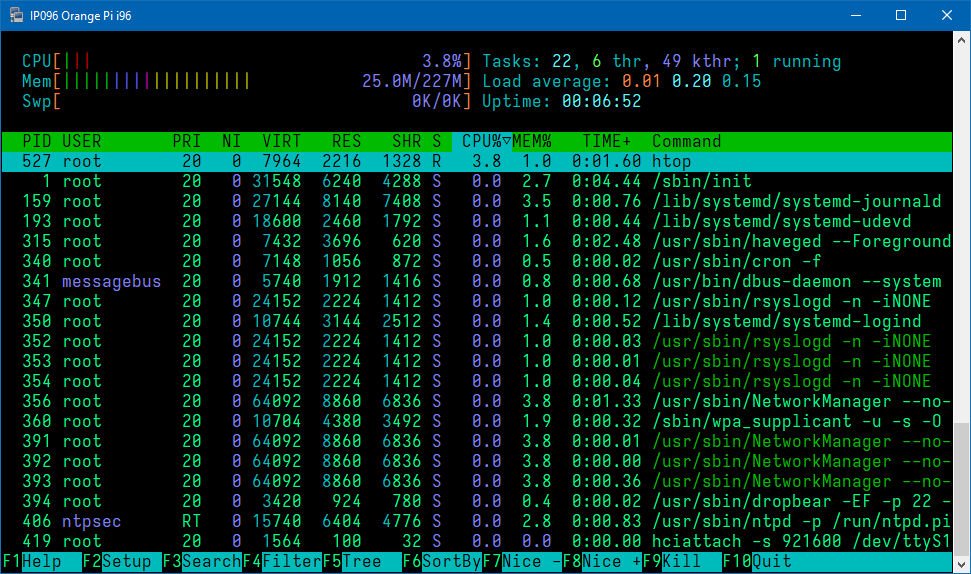
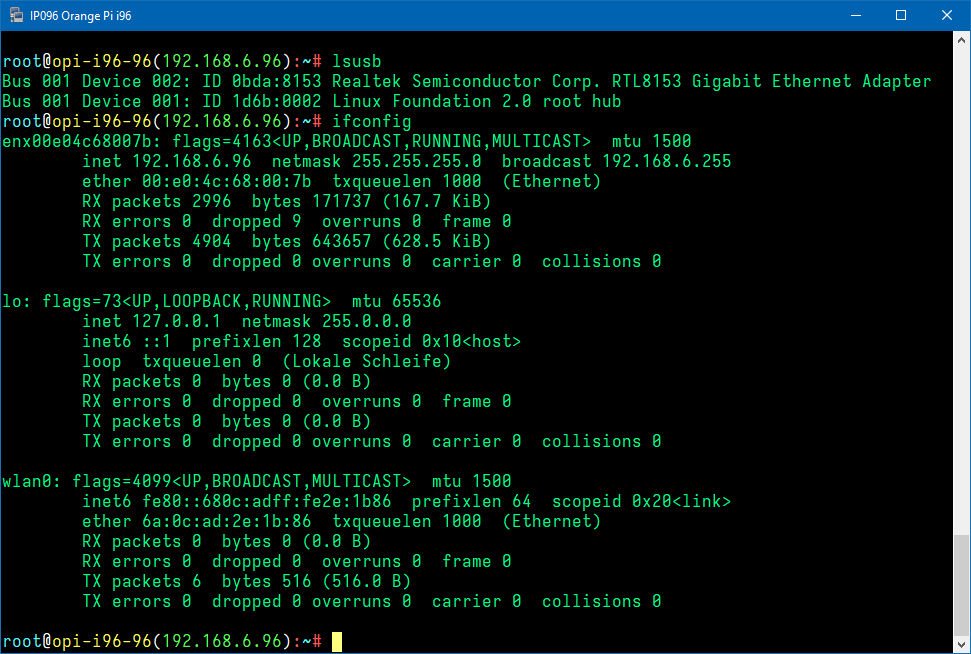
more /proc/cpuinfo Processor : ARMv7 Processor rev 1 (v7l) processor : 0 model name : ARMv7 Processor rev 1 (v7l) BogoMIPS : 370.93 Features : swp half thumb fastmult vfp edsp thumbee neon vfpv3 tls vfpv4 CPU implementer : 0x41 CPU architecture: 7 CPU variant : 0x0 CPU part : 0xc05 CPU revision : 1 Hardware : rda8810 Revision : 0000 Serial : 0000000000000000
-
@Vidor armbian may see/use the RTL8188CUS as RTL8192CUS like on my Logilink WL0084A (which should have a RTL8188CUS):
TP-LINK TL-WN725N Rev V1 - RTL8188EU [247548.026879] usb 1-1: new high-speed USB device number 3 using ehci-platform [247548.186436] usb 1-1: New USB device found, idVendor=0bda, idProduct=8179, bcdDevice= 0.00 [247548.187113] usb 1-1: New USB device strings: Mfr=1, Product=2, SerialNumber=3 [247548.187144] usb 1-1: Product: 802.11n NIC [247548.187170] usb 1-1: Manufacturer: Realtek [247548.388942] r8188eu: module is from the staging directory, the quality is unknown, you have been warned. [247548.498252] usbcore: registered new interface driver r8188eu [247549.167691] r8188eu 1-1:1.0: Firmware Version 11, SubVersion 1, Signature 0x88e1 Logilink WL0084A - RTL8188CUS - like TP-LINK TL-WN725N Rev V2/V3 [247297.741636] usb 1-1: Product: 802.11n WLAN Adapter [247297.741675] usb 1-1: Manufacturer: 802.11n WLAN Adapter [247298.168480] rtl8192cu: Chip version 0x10 [247298.465056] rtl8192cu: Board Type 0 [247298.466340] rtl_usb: rx_max_size 15360, rx_urb_num 8, in_ep 1 [247298.467873] rtl8192cu: Loading firmware rtlwifi/rtl8192cufw_TMSC.bin [247298.470442] ieee80211 phy1: Selected rate control algorithm 'rtl_rc' [247298.479578] usbcore: registered new interface driver rtl8192cu
So there are good chances that you adapter will work

-
@Vidor this may depend on the hardware-revision do you get

at this time the are 3 versions
V1 has the Realtek RTL8188CUS as chipset
http://en.techinfodepot.shoutwiki.com/wiki/TP-LINK_TL-WN725N_v1
and the V2 and V3 seems to have the Realtek RTL8188EUS as chipset
http://en.techinfodepot.shoutwiki.com/wiki/TP-LINK_TL-WN725N_v2
-
normally the font and font-size can be reconfigured from the hdmi-console via
dpkg-reconfigure console-setup
-
I also had this issue the last time I reinstalled the build-system.
I have a 18MBit line, but do not get from all servers >= 500Kb sec.
It depends on the country.
As Iam in turkey - most servers are very slow and if I have the chance (like on debian install) I choose the servers in Germany which are much faster for me (up to 1800Kb/sec), but armbian didnt let choose me

-
I also use a Orange Pi One as PiHole without problems.
As Backup a NanoPi A64 is also running here PiHole if the Orange Pi One is down

-
At the page https://myr2d2build.com/build/issues-91-100/issue-99/ we could see thats the R2D2 Board
(which was in Issue 99)is a board from the company named "Orange Pi" named ROBOT v1.2 ,
but the pictures arent sharp enough to read more.If the Board contains a SDCard and not only emmc then it could be more easy to replace the sounds.
-
The Kernel 6.0.10 is working for me here.
Only got the problems with the not installed DTBs/Overlays - the Neo2 DTBs/Overlays I copied out of the NanoPi A64 install with Kernel 6.0.10
With 6.0.10 I can wait for 6.1 to come

Linux npi-neo2-24 6.0.10-sunxi64 #22.11.1 SMP Wed Nov 30 11:26:36 UTC 2022 aarch64 GNU/Linux
-
Today I had the same problem with my two Neo2 v1.0

After Update/Reboot the director /boot/dtb/allwinner/overlay was completly missing for dtb-6.0.10-sunxi64
(and the directory /boot/dtb-6.0.10-sunxi64/allwinner/ has only -dtb files from the end of Noveber (maybe they are right))
But Iam was in the lucky case that my NanoPi A64 had upgraded successfully to 6.0.10 and all the dtb-files including the overlay-folde for 6.0.10 was there.
So I copied these files over to /boot/dtb/allwinner (symbolic link dtb => dtb-6.0.10-sunxi64) and
by restarting the Neo2 v1.0 did boot again, because of the missing overlays .dtbo/.scr the Neo2 V1.0 wasnt booting only to emergency mode

If anyone need the dtb-directory for sunxi64 and Kernel 6.0.10 I will attach they here at this thread.
I dont know whats the difference between the Neo2 and the NanoPi A64 (both sunxi64).
The upgrade to 6.0.10 did also work fine on a Orange Pi Zero (sunxi only)
-
@Nefedorov Sorry - I have no clue about it. For the 5102 I corrected the .DTBs with some other user to make it work.
I have no idea abot TDM and how to use 4 soundcards at once

-
Because I didnt want a end0: as eth0: device on my NanoPi A64 I added
extraargs=net.ifnames=0
to my /boot/armbianEnv.txt
But on bootup the armbian-motd told me
RX today: Error: No interface matching "eth0" found in database.
The armbian-motd in /etc/default has the line
PRIMARY_INTERFACE="$(ls -1 /sys/class/net/ | grep -E "en|eth|wl" -m 1)"
On the commandline I do get a clear etho with this command:
root@npi-a64-116:~# ls -1 /sys/class/net/ | grep -E "en|eth|wl" -m 1
eth0Where is "the database"? and why have we an end0: device (and not and enx?)
[EDIT]
found how to add the eth0 to the database (on my other SBCs is was already there).
The command is:
vnstat --add -i eth0
in the thread
System diagnosis information has been uploaded to https://paste.armbian.com/etodezihuf
-
As Caution-Information:
Today I updated a NanoPi Neo 2 v1.1 with armbian bullseye bleeding edge-kernel-setting via
apt update/upgrade from Kernel 5.19.16 to 6.0.10 (also from armbian 22.08 to armbian 22.11.1)
and had a no-boot after restart

serial-TTL-Log after reboot:
SpoilerU-Boot 2021.10-armbian (Aug 04 2022 - 13:33:04 +0300) Allwinner Technology
CPU: Allwinner H5 (SUN50I)
Model: FriendlyARM NanoPi NEO 2
DRAM: 1 GiB
MMC: mmc@1c0f000: 0
Loading Environment from FAT... Unable to use mmc 0:1... In: serial
Out: serial
Err: serial
NanoPi NEO2 v1.1 detected
Net: phy interface7
eth0: ethernet@1c30000
230454 bytes read in 12 ms (18.3 MiB/s)
starting USB...
Bus usb@1c1a000: USB EHCI 1.00
Bus usb@1c1a400: USB OHCI 1.0
Bus usb@1c1d000: USB EHCI 1.00
Bus usb@1c1d400: USB OHCI 1.0
scanning bus usb@1c1a000 for devices... 1 USB Device(s) found
scanning bus usb@1c1a400 for devices... 1 USB Device(s) found
scanning bus usb@1c1d000 for devices... 1 USB Device(s) found
scanning bus usb@1c1d400 for devices... 1 USB Device(s) found
scanning usb for storage devices... 0 Storage Device(s) found
Autoboot in 1 seconds, press <Space> to stop
switch to partitions #0, OK
mmc0 is current device
Scanning mmc 0:1...
Found U-Boot script /boot/boot.scr
3202 bytes read in 3 ms (1 MiB/s)
## Executing script at 4fc00000
U-boot loaded from SD
Boot script loaded from mmc
232 bytes read in 2 ms (113.3 KiB/s)
Failed to load '/boot/dtb/allwinner/sun50i-h5-nanopi-neo2-v1.1.dtb'
libfdt fdt_check_header(): FDT_ERR_BADMAGIC
No FDT memory address configured. Please configure
the FDT address via "fdt addr <address>" command.
Aborting!
Failed to load '/boot/dtb/allwinner/overlay/sun50i-h5-usbhost1.dtbo'
Failed to load '/boot/dtb/allwinner/overlay/sun50i-h5-usbhost2.dtbo'
Failed to load '/boot/dtb/allwinner/overlay/sun50i-h5-fixup.scr'
10868181 bytes read in 451 ms (23 MiB/s)
22179848 bytes read in 919 ms (23 MiB/s)
Moving Image from 0x40080000 to 0x40200000, end=41790000
## Loading init Ramdisk from Legacy Image at 4ff00000 ...
Image Name: uInitrd
Image Type: AArch64 Linux RAMDisk Image (gzip compressed)
Data Size: 10868117 Bytes = 10.4 MiB
Load Address: 00000000
Entry Point: 00000000
Verifying Checksum ... OK
ERROR: Did not find a cmdline Flattened Device Tree
Could not find a valid device tree
SCRIPT FAILED: continuing...
libfdt fdt_check_header(): FDT_ERR_BADMAGIC
Scanning disk mmc@1c0f000.blk...
Found 2 disks
No EFI system partition
BootOrder not defined
EFI boot manager: Cannot load any image
MMC Device 1 not found
no mmc device at slot 1Device 0: unknown device
ethernet@1c30000 Waiting for PHY auto negotiation to complete....... done
BOOTP broadcast 1
DHCP client bound to address 192.168.6.151 (706 ms)
*** ERROR: `serverip' not set
Cannot autoload with TFTPGET
missing environment variable: pxeuuid
missing environment variable: bootfile
Retrieving file: pxelinux.cfg/01-02-01-fc-7c-c2-7d
*** ERROR: `serverip' not set
missing environment variable: bootfile
Retrieving file: pxelinux.cfg/C0A80697
*** ERROR: `serverip' not set
missing environment variable: bootfile
Retrieving file: pxelinux.cfg/C0A8069
*** ERROR: `serverip' not set
missing environment variable: bootfile
Retrieving file: pxelinux.cfg/C0A806
*** ERROR: `serverip' not set
missing environment variable: bootfile
Retrieving file: pxelinux.cfg/C0A80
*** ERROR: `serverip' not set
missing environment variable: bootfile
Retrieving file: pxelinux.cfg/C0A8
*** ERROR: `serverip' not set
missing environment variable: bootfile
Retrieving file: pxelinux.cfg/C0A
*** ERROR: `serverip' not set
missing environment variable: bootfile
Retrieving file: pxelinux.cfg/C0
*** ERROR: `serverip' not set
missing environment variable: bootfile
Retrieving file: pxelinux.cfg/C
*** ERROR: `serverip' not set
missing environment variable: bootfile
Retrieving file: pxelinux.cfg/default-arm-sunxi-sunxi
*** ERROR: `serverip' not set
missing environment variable: bootfile
Retrieving file: pxelinux.cfg/default-arm-sunxi
*** ERROR: `serverip' not set
missing environment variable: bootfile
Retrieving file: pxelinux.cfg/default-arm
*** ERROR: `serverip' not set
missing environment variable: bootfile
Retrieving file: pxelinux.cfg/default
*** ERROR: `serverip' not set
Config file not found
BOOTP broadcast 1
DHCP client bound to address 192.168.6.151 (678 ms)
*** ERROR: `serverip' not set
Cannot autoload with TFTPGET
BOOTP broadcast 1
DHCP client bound to address 192.168.6.151 (704 ms)
*** ERROR: `serverip' not set
Cannot autoload with TFTPGET
=>
The problem was (the system did work fine before incl. restart etc), that the file
/boot/dtb/allwinner/sun50i-h5-nanopi-neo2-v1.1.dtb
was missing - and also the complete directory
/boot/dtb/allwinner/overlay/
including
/boot/dtb/allwinner/overlay/sun50i-h5-usbhost1.dtbo
/boot/dtb/allwinner/overlay/sun50i-h5-usbhost2.dtbo
/boot/dtb/allwinner/overlay/sun50i-h5-fixup.scr
was also mising

I had to open my silver-Neo2-NAS-case, extract the SDCard and copy this file and directory from ym other Neo2 (under kernel 5.19.16) over to the SDcard from ym Neo 2 v1.1
So I dont know if I get the same problem, when I try to update my 2 Neo 2 v1.0

Anyone else had bootup-lockup(s) after the 22.11 update?
-
I can recommend the USB Image Tool:
Info-Page: https://www.alexpage.de/usb-image-tool/
Download at: https://www.alexpage.de/usb-image-tool/download/
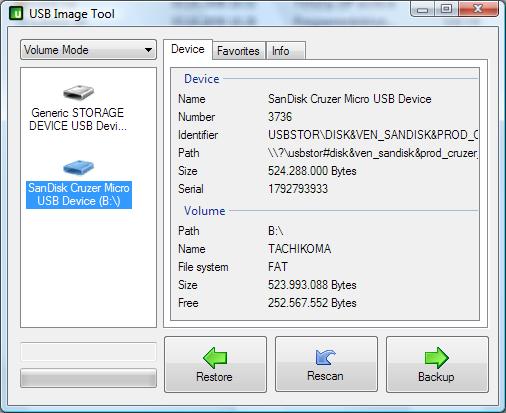



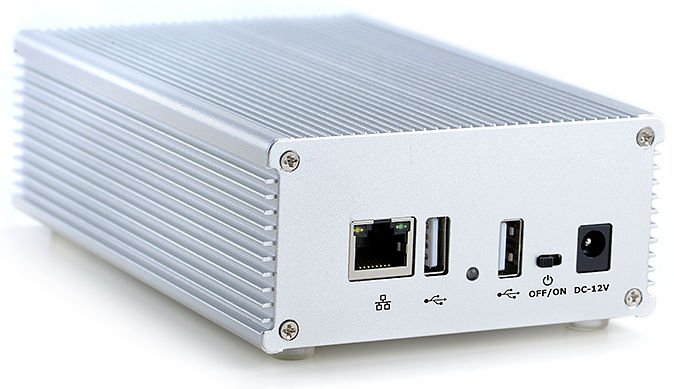
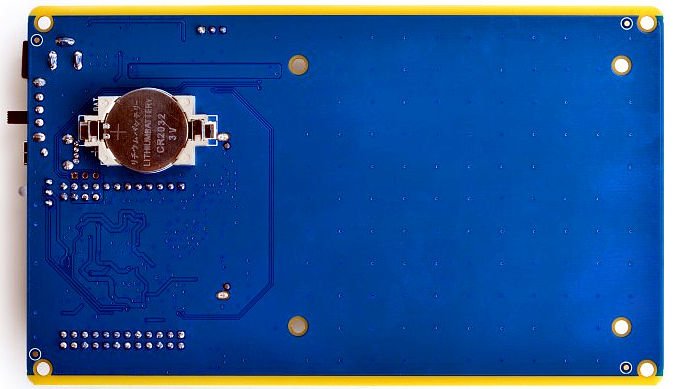
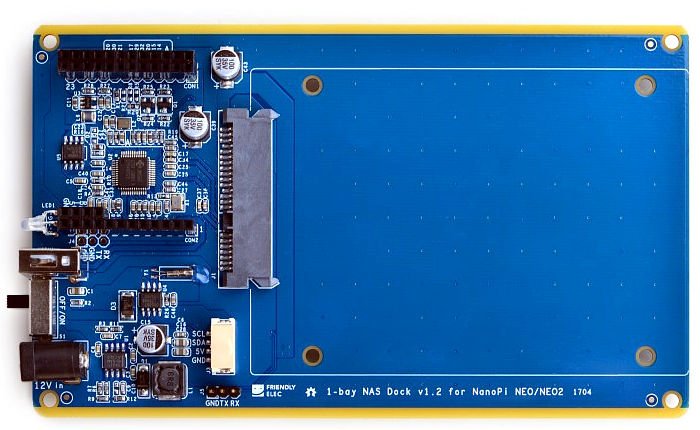
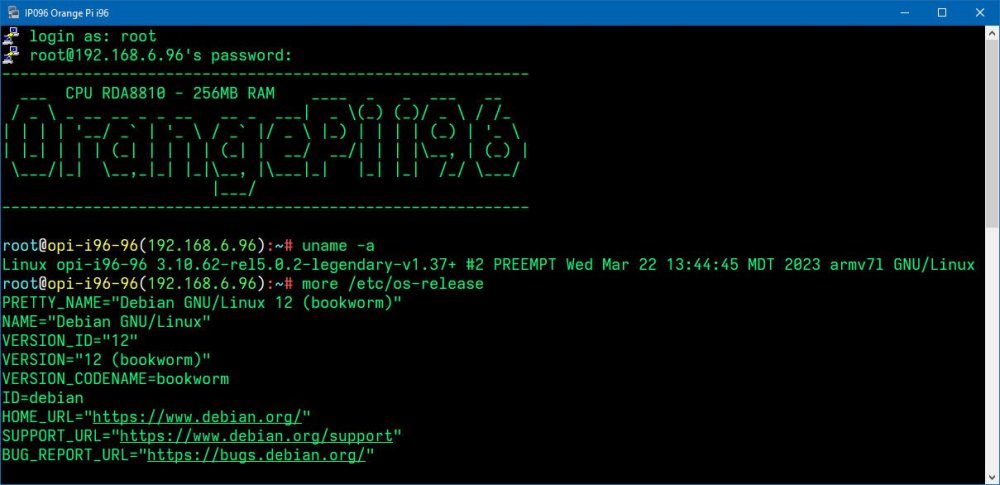
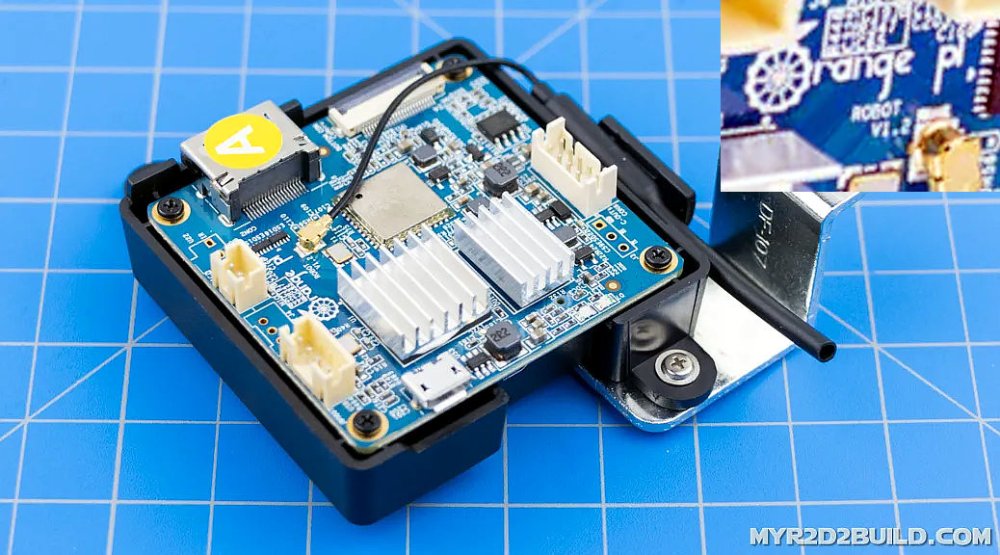
Jide Remix Mini (1G/2G) can now (since February) use unofficial armbian
in Off-topic
Posted
In the past (2019)
there was no chance to use the A64-CPU Jide Remix Mini with armbian, because of a blocked -u-boot

 AT this time the 16GB emmc isnt useable, but using SDCard is a start for upcycling the Jide Remix Mini
AT this time the 16GB emmc isnt useable, but using SDCard is a start for upcycling the Jide Remix Mini 
But today I found a site (from February 2025 on github)
https://github.com/r4nd3l/revived_remix_mini_pc?tab=readme-ov-file
which can make the Closed Jide Remix Mini to boot from SDCard with a modified u-boot
There at the github page is a modified u-boot and a modified A64 armbian for the Jide Remix Mini.
Jide did leave us with a closed/blocked device